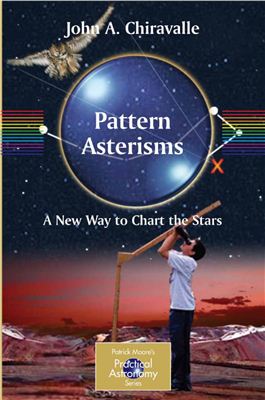Springer, 2006. - 182 Pages.
Since the very beginning of astronomy, people have looked up sky and constructed pattes – the constellations – out of the almost random scattering of stars in the night sky. The fact that the constellations are still used to day reflects not their historical origins, but their usefulness in identifying bright stars in the rotating dome of the sky. Most people (and all astronomers) are familiar with, for example, the constellation of Orion and can thus easily point to Betelguese and Bellatrix as being Orion’s "shoulders". It is the patte made by the constellation that makes them easy to identify.
What applies to big groups of stars can also be applied to smaller ones, and this book provides a set of memorable mini-constellations to help in identifying and remembering stars in the binocular or low magnification telescopic field.
Suitable for observers using binoculars and medium size telescopes, this catalog includes star pictures, dot-to-dot outlines of the objects ( on a negative photograph for clarity ), and an artistic image next to the star pattes. Size, stellar magnitudes, and coordinates are provided, along with north direction, star-hopping instructions & Sky Atlas 2000 references.
There are sixty-seven "patte asterisms" in this catalog. Most are easy to see in sixty millimetre binoculars, and few are what observers describe as "challenging".
The imaginative observer will surely begin to develop a new insight into star pattes, and will start seeing pattes of his own, under this catalog's influence!
Since the very beginning of astronomy, people have looked up sky and constructed pattes – the constellations – out of the almost random scattering of stars in the night sky. The fact that the constellations are still used to day reflects not their historical origins, but their usefulness in identifying bright stars in the rotating dome of the sky. Most people (and all astronomers) are familiar with, for example, the constellation of Orion and can thus easily point to Betelguese and Bellatrix as being Orion’s "shoulders". It is the patte made by the constellation that makes them easy to identify.
What applies to big groups of stars can also be applied to smaller ones, and this book provides a set of memorable mini-constellations to help in identifying and remembering stars in the binocular or low magnification telescopic field.
Suitable for observers using binoculars and medium size telescopes, this catalog includes star pictures, dot-to-dot outlines of the objects ( on a negative photograph for clarity ), and an artistic image next to the star pattes. Size, stellar magnitudes, and coordinates are provided, along with north direction, star-hopping instructions & Sky Atlas 2000 references.
There are sixty-seven "patte asterisms" in this catalog. Most are easy to see in sixty millimetre binoculars, and few are what observers describe as "challenging".
The imaginative observer will surely begin to develop a new insight into star pattes, and will start seeing pattes of his own, under this catalog's influence!

